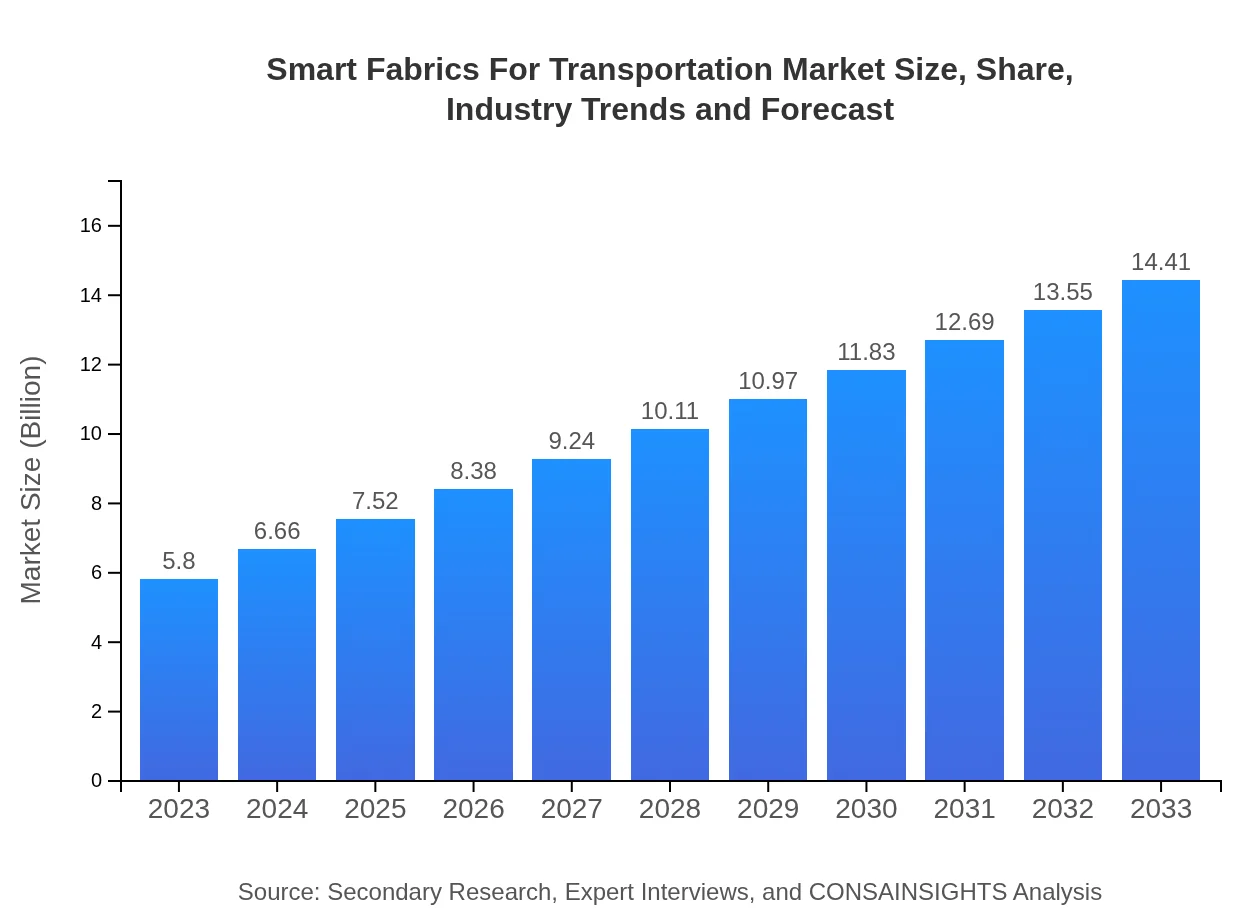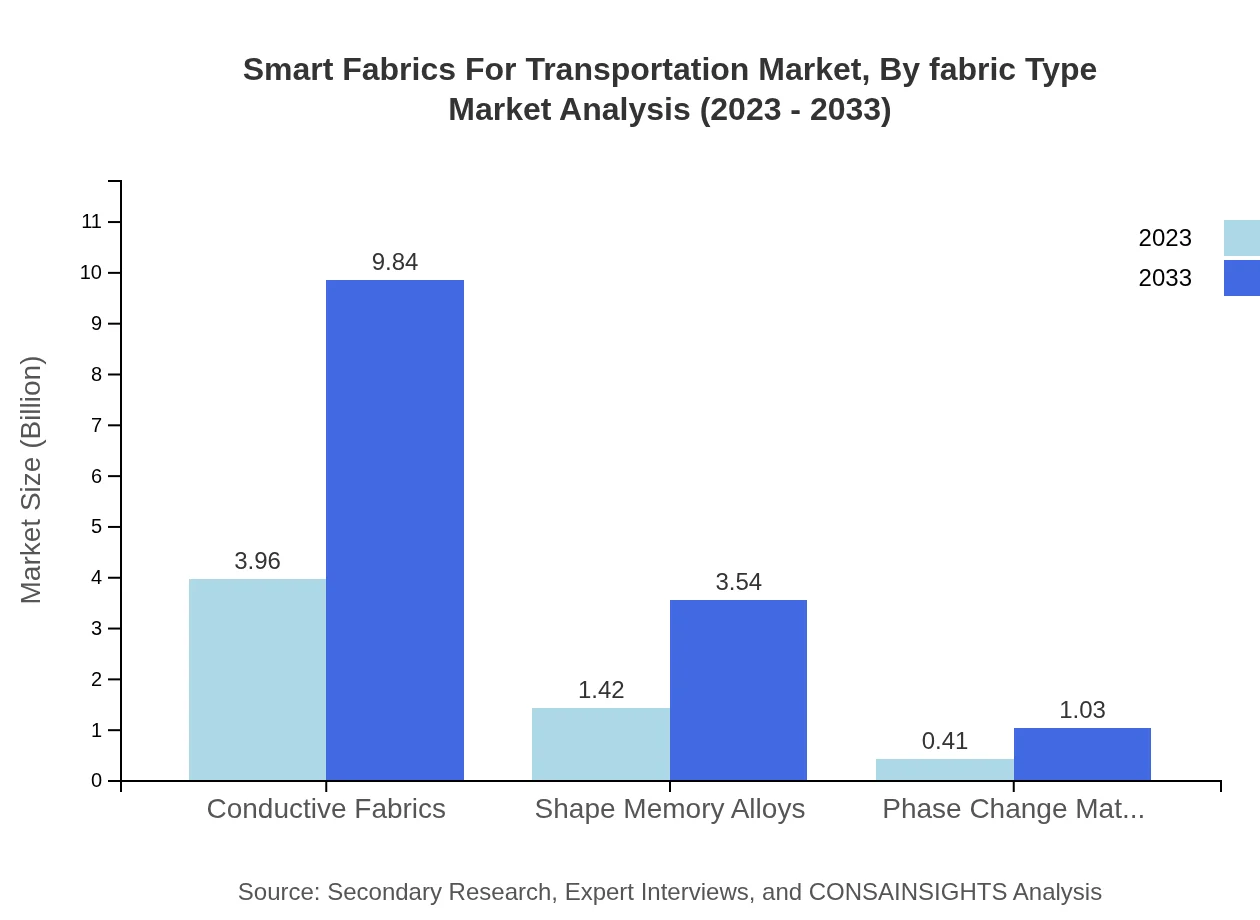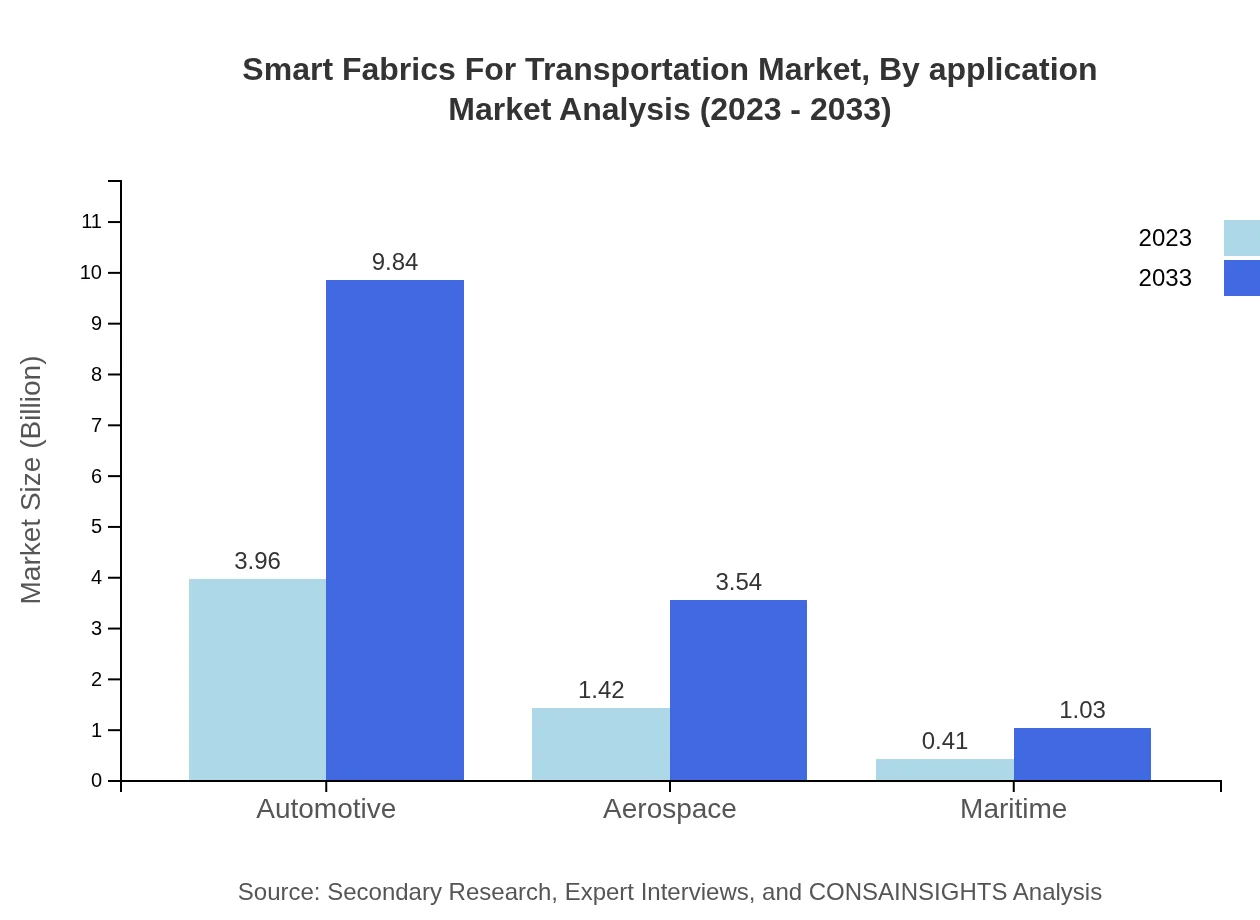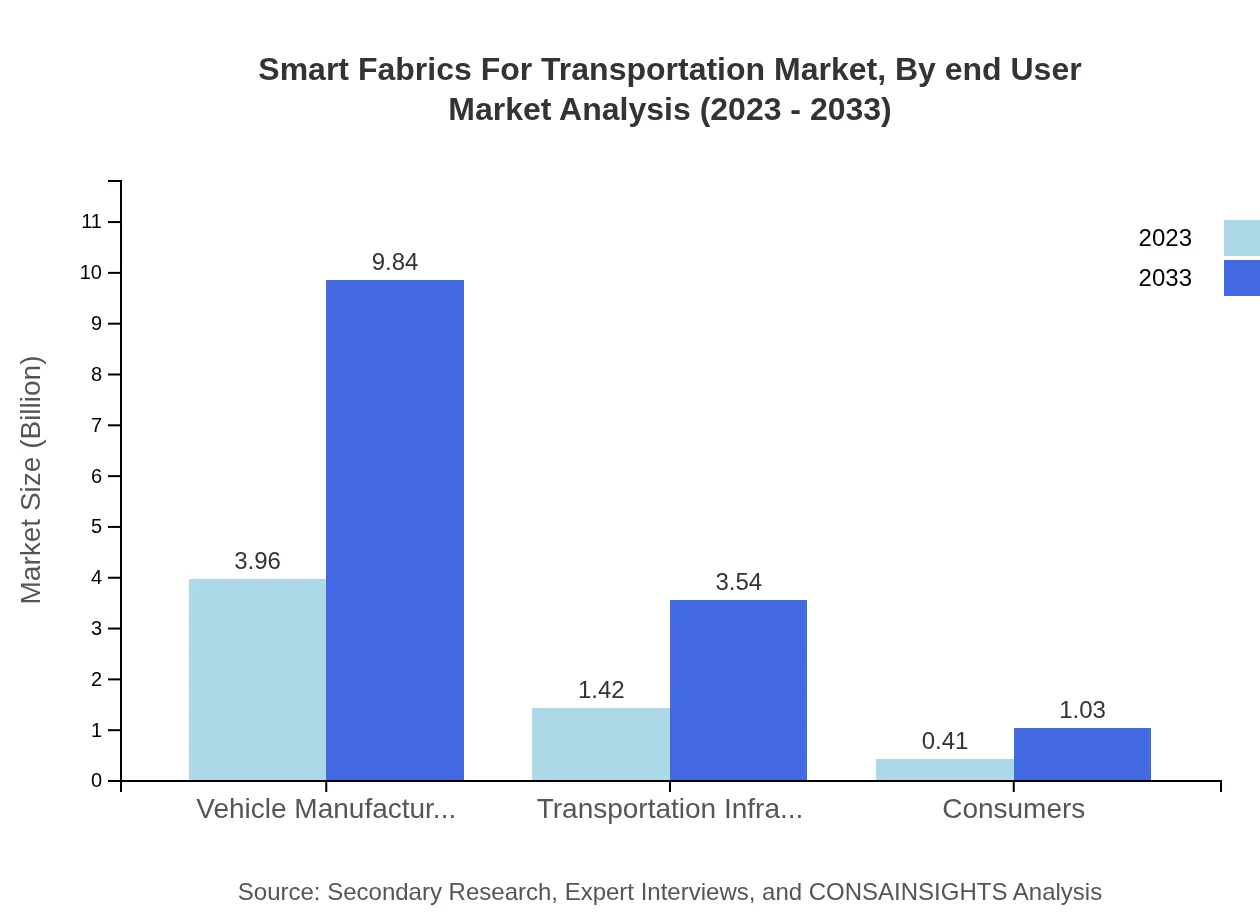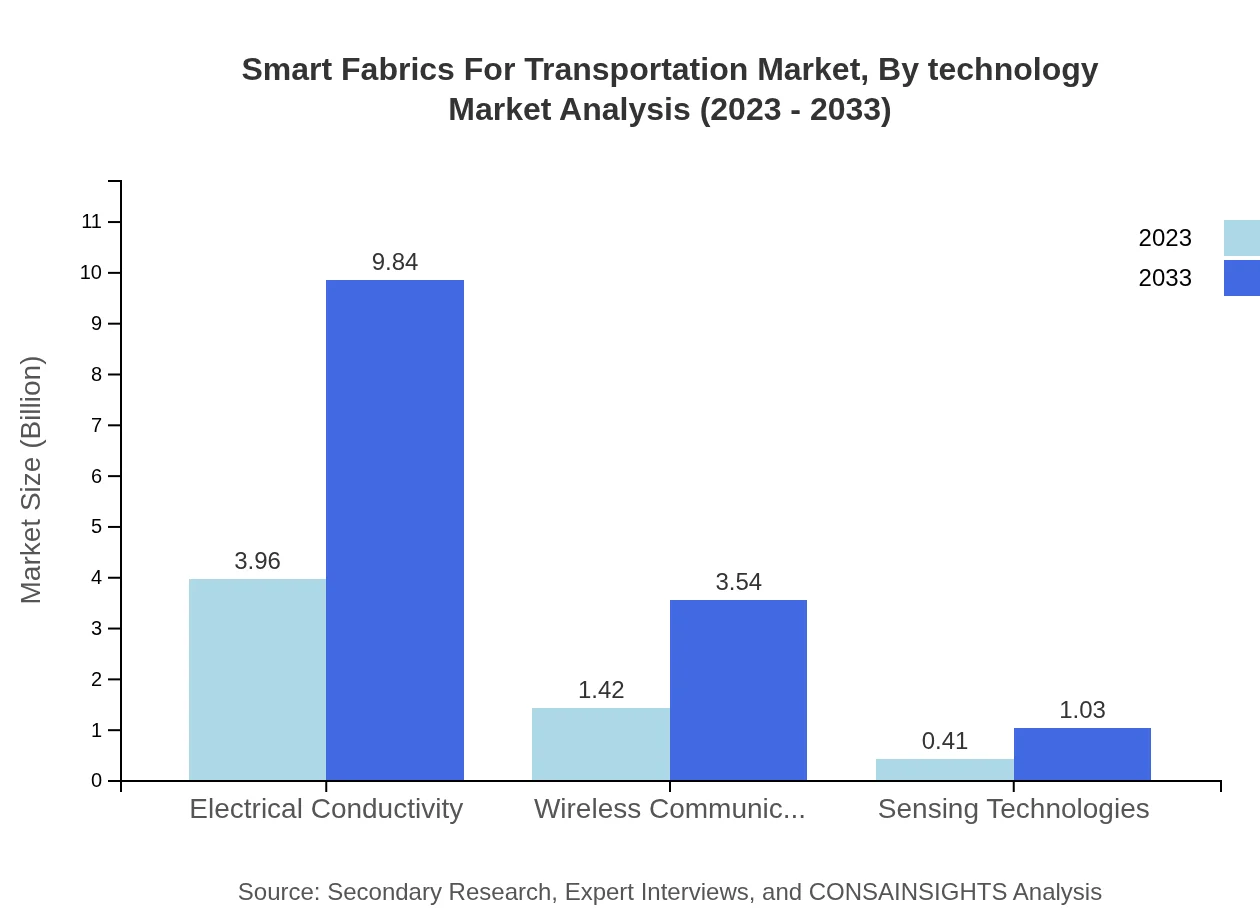Smart Fabrics For Transportation Market Report
Published Date: 31 January 2026 | Report Code: smart-fabrics-for-transportation
Smart Fabrics For Transportation Market Size, Share, Industry Trends and Forecast to 2033
This report provides a comprehensive analysis of the Smart Fabrics for Transportation market, covering current trends, market dynamics, and detailed forecasts from 2023 to 2033, aimed at stakeholders seeking informed insights into this innovative sector.
| Metric | Value |
|---|---|
| Study Period | 2023 - 2033 |
| 2023 Market Size | $5.80 Billion |
| CAGR (2023-2033) | 9.2% |
| 2033 Market Size | $14.41 Billion |
| Top Companies | MPOWERD, BASF, Textronics, Antaris, |
| Last Modified Date | 31 January 2026 |
Smart Fabrics For Transportation Market Overview
Customize Smart Fabrics For Transportation Market Report market research report
- ✔ Get in-depth analysis of Smart Fabrics For Transportation market size, growth, and forecasts.
- ✔ Understand Smart Fabrics For Transportation's regional dynamics and industry-specific trends.
- ✔ Identify potential applications, end-user demand, and growth segments in Smart Fabrics For Transportation
What is the Market Size & CAGR of Smart Fabrics For Transportation market in 2023?
Smart Fabrics For Transportation Industry Analysis
Smart Fabrics For Transportation Market Segmentation and Scope
Tell us your focus area and get a customized research report.
Smart Fabrics For Transportation Market Analysis Report by Region
Europe Smart Fabrics For Transportation Market Report:
Europe's market is expected to grow from $1.61 billion in 2023 to reach $4.00 billion by 2033, driven by stringent regulations regarding passenger safety and a strong emphasis on technological integration in transportation systems.Asia Pacific Smart Fabrics For Transportation Market Report:
The Asia Pacific region is projected to witness significant growth in the Smart Fabrics for Transportation market, projected to increase from $1.14 billion in 2023 to $2.84 billion by 2033. This growth is driven by rising investments in automotive innovation and advancements in electronic textiles, with China being a major player in manufacturing.North America Smart Fabrics For Transportation Market Report:
North America is anticipated to dominate the market, scaling from $2.16 billion in 2023 to $5.36 billion by 2033. The region benefits from high consumer awareness, extensive R&D efforts, and a robust automotive sector focused on incorporating smart textiles into vehicle designs.South America Smart Fabrics For Transportation Market Report:
In South America, the market is expected to grow from $0.29 billion in 2023 to $0.71 billion by 2033. This growth is supported by an increasing focus on transportation safety and comfort, along with government initiatives supporting technological advancements in the textile industry.Middle East & Africa Smart Fabrics For Transportation Market Report:
The Middle East and Africa region forecasts a market expansion from $0.60 billion in 2023 to $1.49 billion by 2033, mainly due to increasing infrastructure development and the necessity for advanced transportation solutions.Tell us your focus area and get a customized research report.
Smart Fabrics For Transportation Market Analysis By Fabric Type
The primary fabric types include conductive fabrics, textile-based sensors, and Phase Change Materials (PCMs). Conductive fabrics lead the market, growing from $3.96 billion in 2023 to $9.84 billion by 2033, holding a market share of 68.29%. Sensing technologies, although smaller, are gaining traction due to advancements in wearables and IoT connectivity.
Smart Fabrics For Transportation Market Analysis By Application
Aerospace applications, contributing sustainably with examples like lightweight seating and temperature regulation fabrics, expect growth from $1.42 billion to $3.54 billion by 2033, owning nearly 24.56% share. Automotive applications remain the largest segment, dominated by smart textiles in driver safety and comfort.
Smart Fabrics For Transportation Market Analysis By End User
Vehicle manufacturers predominantly drive the market with an expected increase in market size from $3.96 billion to $9.84 billion by 2033. Consumer segments are emergent, with expected growth due to rising adoption of smart clothing.
Smart Fabrics For Transportation Market Analysis By Technology
Innovative technologies, particularly wireless communication and sensing technologies, significantly influence market dynamics. Growth from $1.42 billion to $3.54 billion by 2033 for wireless communication fabrics illustrates the push for interconnected transport solutions.
Smart Fabrics For Transportation Market Trends and Future Forecast
Tell us your focus area and get a customized research report.
Global Market Leaders and Top Companies in Smart Fabrics For Transportation Industry
MPOWERD:
MPOWERD specializes in solar-powered consumer electronics and smart fabrics that integrate renewable energy solutions into textiles, emphasizing sustainability.BASF:
BASF is a leading chemical company that develops smart materials for automotive and construction industries, focusing on high-performance textile solutions.Textronics:
Textronics is at the forefront of integrating textile and electronics, producing smart wearable technology for medical and transportation applications.Antaris,:
Antaris specializes in advanced sensor technologies that are integrated into textiles for various applications, including transportation and logistics.We're grateful to work with incredible clients.









FAQs
What is the market size of smart fabrics for transportation?
The smart fabrics market for transportation is valued at approximately $5.8 billion in 2023, with a robust CAGR of 9.2% expected over the next decade, indicating significant growth potential in this innovative industry.
What are the key market players or companies in this smart fabrics for transportation industry?
Key players in the smart fabrics for transportation industry include industry leaders such as DuPont, conductive fabric manufacturers, and innovative material companies, focusing on integrating technology in transportation solutions and enhancing smart textile applications.
What are the primary factors driving the growth in the smart fabrics for transportation industry?
Growth in the smart fabrics market is driven by advancements in tech integration, increasing demand for enhanced safety features in transport, and a rising focus on sustainability and energy efficiency in fabric technologies.
Which region is the fastest Growing in the smart fabrics for transportation?
The fastest-growing region for smart fabrics in transportation is North America, projected to grow from $2.16 billion in 2023 to $5.36 billion by 2033, indicating a significant market expansion driven by technological innovations.
Does ConsaInsights provide customized market report data for the smart fabrics for transportation industry?
Yes, ConsaInsights provides customized market report data tailored to specific needs in the smart fabrics for transportation industry, allowing clients to gain precise insights and strategic advantages in their market endeavors.
What deliverables can I expect from this smart fabrics for transportation market research project?
Deliverables from the smart fabrics market research project include comprehensive market analysis reports, forecasts, competitive landscape insights, and tailored strategic recommendations for stakeholders in the transportation sector.
What are the market trends of smart fabrics for transportation?
Current trends in the smart fabrics market for transportation involve increasing adoption of wearable tech, innovations in conductive fabrics, and the incorporation of IoT technologies aimed at improving safety and efficiency in various transportation modes.

